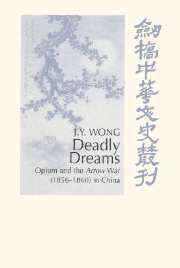Book contents
- Frontmatter
- Contents
- List of Tables
- List of Figures
- Poem by the late Mr Qin Esheng
- Foreword by Professor Wang Gungwu
- Foreword by Professor C. A. Bayly
- Preface
- Part I The confusion of imperialism
- Part II The pretext for imperialism
- Part III The personalities of imperialism
- Part IV The rhetoric of imperialism
- Part V The mechanics of imperialism
- 11 Behind the scenes: The diplomacy of imperialism
- 12 Behind the scenes: The politics of imperialism
- 13 In the wings: The lobbies of imperialism
- Part VI The economics of imperialism
- Part VII The dynamics of imperialism
- Chronology of major events
- Word list
- Abbreviations
- Bibliography
- Index
12 - Behind the scenes: The politics of imperialism
Published online by Cambridge University Press: 29 September 2009
- Frontmatter
- Contents
- List of Tables
- List of Figures
- Poem by the late Mr Qin Esheng
- Foreword by Professor Wang Gungwu
- Foreword by Professor C. A. Bayly
- Preface
- Part I The confusion of imperialism
- Part II The pretext for imperialism
- Part III The personalities of imperialism
- Part IV The rhetoric of imperialism
- Part V The mechanics of imperialism
- 11 Behind the scenes: The diplomacy of imperialism
- 12 Behind the scenes: The politics of imperialism
- 13 In the wings: The lobbies of imperialism
- Part VI The economics of imperialism
- Part VII The dynamics of imperialism
- Chronology of major events
- Word list
- Abbreviations
- Bibliography
- Index
Summary
As with the preceding chapter, we shall begin our analysis from the moment London received news of the quarrel in China, or even before.
I. Commercial interests
As mentioned, on Monday, 29 December 1856, Britons first learned about the Arrow incident and the bombardment of Canton through a telegraphic message from Trieste.1 The attitude of The Times to ‘all this slaughter and desolation must be one of regret that anything should have occurred to render so strenuous an appeal to armed force necessary’. Everybody was left to guess what the cause was. Genuinely feeling uneasy about the bloodshed, the paper expressed the hope that ‘enough has been done to render anything more of the same kind superfluous.’ Unbeknownst to the public, the British government was envisaging that much more of the same kind might be necessary in the immediate future.
The paper continued, ‘In a town so thickly inhabited, containing more than a million and a half of inhabitants, the effect of a bombardment must have been dreadful, and the loss of life enormous’. Thereupon the Victorian liberal conscience spoke out loudly and clearly, ‘We hear only, however, the loss of property by fire’.
But there was another dimension to the quarrel. The telegraphic message ended with this: ‘Commerce was at a standstill’. This caused terrific excitement.
- Type
- Chapter
- Information
- Deadly DreamsOpium and the Arrow War (1856–1860) in China, pp. 283 - 309Publisher: Cambridge University PressPrint publication year: 1998



